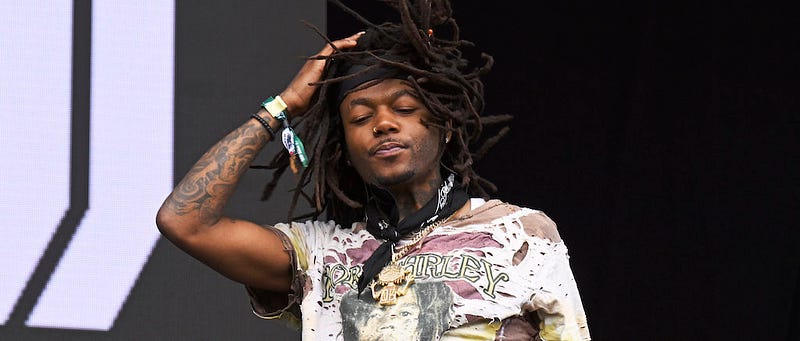
On June 23, 2022, J.I.D, a popular protege of J. Cole, stated the following in a couple of now-deleted tweets: “none of my rap co workers be tryna rap wit me dawg…only women and pop stars lol.” The Atlanta rapper then went on to explain that he feels as though his musical peers are intimidated by the mere proposition of having to rap alongside someone of J.I.D’s caliber. Emphasizing that only women and pop-stars want to collaborate with him as a way of indirectly declaring that rap has gone “soft,” or has lost its competitive fire. These extremely loaded remarks provide the perfect basis for the state of hip-hop as a genre.
Five out of eleven of Billboard’s chart-topping songs in 2022 can be aligned with hip-hop, reinforcing the genre’s dominant presence over the music industry.
Rappers have realized the zeitgeist of mass appeal that they are currently experiencing as artists in the 21st century. It was not always like this though. It was not until 1989 when Billboard distinguished rap as its own official genre, categorizing it as R&B prior. This being said, there was once a time where there was not a broad market for rap music, but with the genre being more lucrative than ever, collaborations sell and competition can burn bridges.
There are various types of collaborations in the hip-hop universe. One such variation is the posse cut. These are almost like friendly exhibitions between companions, and are usually favored by ensemble groups, such as the Wu-Tang Clan and A$AP Mob. Posse cuts can be internally competitive within a conglomerate, or outsiders can be brought in to spice up the event. These tracks are relentless, but true rivalry is often found in the more intimate setting of one rapper inviting others to flex their lyrical abilities. This is the presumed version of musical partnership that elicited the current state of fear that comes with a true egalitarian collaborative effort. While posse cuts are usually extensive enough that poor performances can get overlooked, songs crafted on a smaller scale leave each member of the record to be scrutinized relative to each other. This concern is what is often perceived to be the main contributor to its style falling out of preference.
Nothing is more embarrassing than inviting someone to work with you on something you originated, just to receive less credit than your guest services. Two cornerstones of hip-hop lore that perfectly exemplify this horror is the song “Renegade” by Jay-Z featuring Eminem, as well as an unreleased track titled
Control
by Big Sean featuring Kendrick Lamar and Jay Electronica. Eminem’s and Lamar’s reputations were aided by their contributions to these tracks, moreso than the original artists. Jay-Z’s “Renegade” served as a punchline for his feud with Nas, when Nas claimed in his legendary diss track, “Ether,” that “Eminem murdered you on your own s**t.” Then, over a decade later, Big Sean released “Control,” a song that featured a lyrical barrage from Lamar, who spent much of his verse calling out other rappers for being beneath him skill-wise, going as far to even mention the duo with whom he is co-starring on the song. Rap used to be a contact sport, lyrical ability served as credibility that would earn more opportunities in the genre, but as sectors of hip-hop become a pop amalgamation, it is rare for rappers to even be in the studio together when creating a project together.
So, where is the current state of rap and hip-hop then? DJ Khaled’s latest album,
GOD DID
, as well as his entire discography, is a prime indicator of how the culture has evolved. The genre has become an art of tastemaking, knowing how to compose something sonically pleasing with rappers that stylistically mesh well together. Even though DJ Khaled is truly just a middle-man with little to no involvement in the musical production of his own albums, the fact that hip-hop artists are so eager to fill up his roster spots validates how transactional the industry has become. On
GOD DID
, there is a track titled “USE THIS GOSPEL — REMIX”, which is an altered version of a Kanye West original, but now featuring Eminem. Recently, California rapper The Game released a diss track of epic proportions on Eminem on his latest album; an album that features two appearances from Kanye West. Years ago, you would never see a rapper like Kanye sharing separate stages with two feuding hip-hop acts, as alliances were either engraved in geographical composition or by whoever had closer ties with the other. In 2022 though, DJ Khaled, the embodiment of the commodification of hip-hop, managed to unite such performers.
Hip-hop record labels such as
Dreamville
and
Top Dawg
Entertainment
have attempted to reinvigorate the pride that was once held in the genre through encouraging friendly competition between its employees, but as creative independence becomes more essential to rising stars, such examples are quickly disappearing. Maybe the general communal truce within hip-hop is for the better, as it discourages conflicts from being escalated outside of the music as it has in the past (i.e. the murders of 2Pac and The Notorious B.I.G.), but there are certainly aspects to be missed about the lost passion of the collaboration.
















